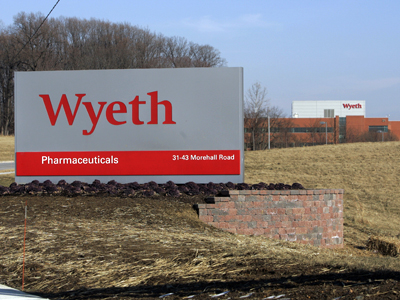RADNOR About a decade has elapsed since the last Wyeth
workers walked out of the complex in Radnor Township that had served as their
company's global headquarters since the 1950s.
More than history, their departure for a new headquarters in
Collegeville created something nearly as valuable: a sprawling piece of
commercial property in one of the region's most desirable but largely developed
zip codes.
The 26-acre parcel,near the intersection of I-476 and Route
30, represents one of Radnor's largest development opportunities in years. But
plans to revitalize the mostly vacant site have stirred as much controversy.
Last week, dozens of people filled the municipal building
for a meeting on the plan that stretched past midnight.
It ended without a final vote on the project, but after an
airing of complaints and an apology from the township administrator, who had
been accused of dispatching police to "intimidate" an opponent of the
plan.
To some residents, the debate is part of larger concerns
over the future of Radnor, a Delaware County community of about 31,000
residents.
"This is not some situation where I don't want my
neighbor putting in a pool. Many of us are afraid that this will change the
character of the town forever," said Albert Murphy, a former Planning
Commission member, echoing a common sentiment.
The property owner, BioMed Realty Trust, wants to build a
350-unit apartment building, a hotel, office space, and retail shops on the
King of Prussia Road site, a tract across from Radnor High School and a stone's
throw from heavily traveled roads that already tend to clog at rush hour.
Representatives of Brandywine Realty Trust, which owns much
of the commercial properties in Radnor, say the traffic brought by BioMed's
proposal could drive away their tenants.
The tensions peaked when it was revealed that Brandywine's
president and CEO, Gerald Sweeney, had sent the township commissioners a letter
claiming that township police officers had been dispatched to the offices of
the company's lawyer, Marc Kaplin, in a bid to silence the company. Sweeney
contended Radnor officials also accused Brandywine of trying to intimidate
township staffers.
At last week's meeting, Township Administrator Robert
Zienkowski apologized for his role in the dustup, saying Brandywine had been a
good neighbor and conceding that he had been "passionate" at times
about local matters.
"This was an overreaction by the township," added
Radnor's solicitor, John Rice. "It could have been handled differently and
should have been handled differently."
Some Radnor officials say BioMed's latest proposal is better
than its first, which consisted solely of office space, and would have added
hundreds of cars in the area during peak commuting times.
Commissioner William A. Spingler said that he and others had
been working to make the project as beneficial to the township as possible.
They also will consider a change that could shrink the
overall project size, and have asked the developer to limit most of the
apartments to one-bedroom units targeted to young professionals and empty
nesters, and provide parking spots for car-share services to motivate commuters
to take the train.
Still, the plan's fate seems assured. The land in question
is zoned for commercial use. And the commissioners approved changes to the
zoning ordinance that will allow for some version of the project.
"People see this plan that we're considering, and what
gets lost to everyone is that the owners have the right to develop this
land," said Elaine Schaefer, president of the Board of Commissioners.
"We have to be very cognizant of that, and realize that we cannot reject
things without just cause."
In a statement, Rick Howe of BioMed said he believes the
project would stimulate the local economy by bringing high-paying jobs to
Radnor.
"We remain committed to working with the Radnor
community and political leaders to answer any questions about this
project," Howe said.
Source: Philly.com

No comments:
Post a Comment